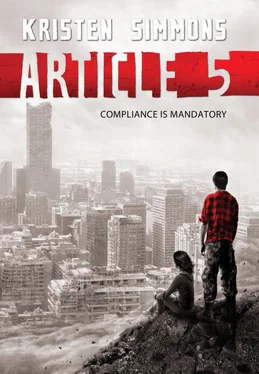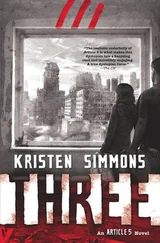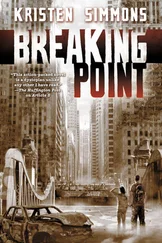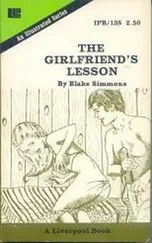“Sorry. A soldier took my ID during our last inspection. Said it was part of the census. He said I could still drive.”
“Yeah, yeah,” nodded the highway patrol, as though this were a commonplace occurrence. I remembered the way Bateman had tucked my mother’s ID into his pocket during her arrest.
The soldier scanned the bar code on the registration and squinted at a tiny screen, presumably checking for outstanding warrants. I was ready to crawl out of my skin.
“Lucky there’s a freeze on car payments, Mr. Kandinsky. Your registration’s expired. Three years.”
Chase nodded. The soldier handed back the registration.
“So, where you headed?” he asked. “Town’s cleared. Been empty for months.”
My hands squeezed each other with bone-breaking intensity. I flipped them over to hide the bruises.
“I know,” Chase lied smoothly. “My aunt’s got a place just down a-ways. I told her I’d check in on it. We’ve got a pass.”
“Let’s see it.”
Chase reached into his pocket. Just beside the gun. I turned to face the opposite window, eyes squeezed shut. My fingers clenched in the blanket as I braced for the gunfire.
He’s going to do it, I thought. He’s going to shoot this man.
“I saw it in your jacket pocket,” I blurted. Soldier or not, this man had done nothing to us. Chase shot me a scathing look.
“This your girlfriend?” asked the soldier, finally registering my presence. His eyes were roaming over my hands. I forced them to steady.
“My wife,” Chase answered between his teeth.
Yes, of course. An unmarried couple would be issued an Indecency Citation for spending time alone together so close to curfew. It occurred to me the soldier had been looking at my hands for a ring. If we lived through this, I’d have to find some cheap jewelry.
“Good thing,” he commented. My stomach twisted.
Chase looked at me. “In my jacket? Really?” He winced. “Damn. I left it at home then. I’m sorry, sir.”
“What was the number?” the soldier tested.
“U-fourteen. That was it, wasn’t it honey?”
I nodded, trying not to look petrified.
“It was a blue form, about this big.” Chase motioned with his hands the size of an index card.
“Yeah, that’s the right form.” The soldier bounced the scanner in his opposite hand, thinking. “I’m letting you off the hook, but make sure the next time you venture into an evacuated area, you have a pass, got it? You’ve got twenty-four hours.”
“Yes, sir,” said Chase. “Thank you, sir.”
A few minutes later, the cruiser disappeared behind a turn in the road.
“Oh. Wow.” The words were sticky in my throat.
“Old bastard can’t even do his job right,” Chase said. “The regs clearly state you can’t allow a civilian to enter a Red Zone without a U-fourteen. Everyone knows that.”
“Thank God he didn’t!” I practically shouted.
Chase lifted a brow. “Well. Yes.”
A somber fog settled over us. I couldn’t help wondering what Chase would have done had I not said anything. I knew by his demeanor now that he hadn’t intended to shoot him, but I also knew he hadn’t taken the option off the table.
Nothing happened, I reminded myself.
But tomorrow, after we’d been registered missing, this scene would play out very differently.
It was time to get off the road.
* * *
WEdrove through the empty streets of the Red Zone, hunkering down on an old hunting path beneath the charcoal sky. We hadn’t seen any more cruisers, but Chase said that they patrolled Red Zones to manage crime, and after our run-in with the MM, I wasn’t eager for a replay.
Still, waiting for dawn wasn’t any easier.
I made peanut butter sandwiches to busy my hands, and told myself that it did no good to focus on how we were sitting around while the clock on our safety dwindled down. There was nothing we could do until curfew lifted.
Chase took the sandwiches hesitantly when I shoved three his way.
“I didn’t spit in them,” I told him, long past feeling offended. His brows, arched in surprise, returned to their normal scowl. He may not have been used to someone taking care of him, but I felt compelled; making dinner was my usual chore at home. The reminder, sharp as a knife, brought on a new wave of desperation.
“I have to show you something,” he said, as if to reciprocate for the food I’d made. He went outside, sending a blast of cold air into the cabin of the truck, and reluctantly, I followed with the flashlight.
My breath caught when I saw the silver barrel of the gun emerge from his waistband.
It was too dark, and the woods smelled too heavily of dead leaves and earth. A sick sense of dread emptied my mind of the present and took control of my senses. I could still hear that fateful metal click, hear Randolph’s voice, pitched with excitement, accusing me of running.
“Hey,” Chase said quietly, startling me when he was closer than I expected. I shoved away from him, gulping a mouthful of frigid air.
“I’ve already seen it,” I told him. My heart was beating like I’d just run a mile, but I stood tall, hoping he hadn’t noticed my lapse.
Get it together, I told myself. Chase wasn’t a soldier anymore. I wasn’t at the reformatory. I shouldn’t have to remind myself of that.
His brows drew together as if in pain. For an instant I could have sworn he’d read my mind, but then his expression hardened once again.
“Do you have any idea how to handle a gun?” His voice was low. I knew he was thinking of what had transpired earlier with the highway patrol.
I cast him an acerbic look. “Do you really have to ask me that question?”
He gripped the barrel, offered the weapon to me.
“I… I don’t like guns,” I said.
“You and me both.”
That was surprising. As a soldier, he would have been used to carrying a firearm. When he didn’t give up, I plucked the handle out of his hand as if it were a dead rat and, surprised at its weight, nearly dropped it.
“Watch where you’re pointing that,” he snapped.
I winced and aimed the barrel toward the ground.
“It’s heavy.”
“It’s a Browning Hi-Power nine millimeter. A pistol.”
He swallowed, wiped his palms on his pants. Then he gently placed his hands around mine, forcing me to grip the handle but taking care not to press on my injured knuckles. My skin seared with heat where we connected, betraying the will of my mind, which wanted very much to despise him. It was less confusing after everything he’d done.
“Look. This on the side is called the safety. When it’s on you won’t be able to pull the trigger. All right so far?”
“Uh-huh.”
He guided my hands, showed me how to empty a clip.
“The magazine holds the thirteen rounds. It’s a semiautomatic, which means that it’s self-loading, but only after you cock back the slide. That chambers the first round. After that, all you need to do is pull the trigger.”
“How convenient.”
“That’s the idea. Now, we’re not really going to do this, but here’s what happens if you get in trouble: Safety off. Pull back the slide. Point and aim. Squeeze the trigger. Use both hands. Got it?”
“Yes, sir.”
“Say it.”
“Safety off. Pull back the slide. Point and aim. Squeeze the trigger.” A forbidden sense of power seemed to vibrate through my hands as I said the words.
He took back the gun, and my ability to breathe returned. But then he pulled out a knife.
For the next ten minutes I hunched over my knees while Chase sawed off my hair by the fistful. Though I knew we had to do as much as we could to avoid recognition, I couldn’t stop the gnawing concern that my mother, Beth, my friends, might soon find me unrecognizable. That all the old pieces of me — the pieces I knew — were being cut away just like my hair, leaving something distorted and raw in their stead. But that was stupid of course; I was still me. It was everything else that had changed.
Читать дальше










